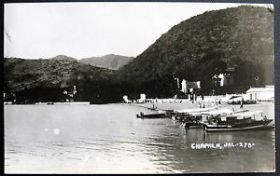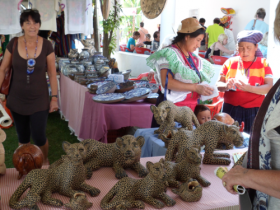How are Americans in Chapala and Ajijic, Mexico treated? How are expats in Chapala and Ajijic, Mexico treated generally?
Spencer McMullen - Chapala Law
 Americans and other expats are treated with respect in Chapala and Ajijic. The Mexican people in general are very respectful.
Americans and other expats are treated with respect in Chapala and Ajijic. The Mexican people in general are very respectful. The Mexican people are very patient with people who don’t speak Spanish. In other countries sometimes they’ll kind of tease you and make fun of you if your Spanish isn’t good or they will demand that you speak in their language. In contrast, Mexicans are very accommodating.
...
 Americans and other expats are treated with respect in Chapala and Ajijic. The Mexican people in general are very respectful.
Americans and other expats are treated with respect in Chapala and Ajijic. The Mexican people in general are very respectful. The Mexican people are very patient with people who don’t speak Spanish. In other countries sometimes they’ll kind of tease you and make fun of you if your Spanish isn’t good or they will demand that you speak in their language. In contrast, Mexicans are very accommodating.
Foreigners have been coming to the Lake Chapala area since the 1950s, so the local people have gotten used to the foreign population. The foreign population generates jobs and brings in good steady part of earnings and money in the area. In general, foreigners pay their help better than Mexican employers.
(1950's photo of Lake Chapala, Mexico, pictured.)
Posted January 2, 2016
Jerry Smith, MD
 Expats are treated well in our area. Here’s an example of the dynamics of how expats are treated. In Ajijic, there are probably 5,000 Mexicans that are middleclass. Because the expats offer so many jobs, we are treated really well. We’re the luck that improved their lifestyles.
Expats are treated well in our area. Here’s an example of the dynamics of how expats are treated. In Ajijic, there are probably 5,000 Mexicans that are middleclass. Because the expats offer so many jobs, we are treated really well. We’re the luck that improved their lifestyles. In Mexico in general, it’s kind of an unwritten law that you don’t mess with the foreigners because tourism is such an important part of the...
 Expats are treated well in our area. Here’s an example of the dynamics of how expats are treated. In Ajijic, there are probably 5,000 Mexicans that are middleclass. Because the expats offer so many jobs, we are treated really well. We’re the luck that improved their lifestyles.
Expats are treated well in our area. Here’s an example of the dynamics of how expats are treated. In Ajijic, there are probably 5,000 Mexicans that are middleclass. Because the expats offer so many jobs, we are treated really well. We’re the luck that improved their lifestyles. In Mexico in general, it’s kind of an unwritten law that you don’t mess with the foreigners because tourism is such an important part of the economy. While there is certainly crime in Mexico, it would not be advantageous to kidnap or extort the expats.
There are tourist places on the beach where the locals butter up the visitors to sell them a condo, but we live here in Ajijic with the Mexican people. We see them every day, they know us, and we know them, so we have a symbiotic relationship that works for everyone. I have several Mexican friends. I've had the same caddie for 15 years, and the starter of the golf course, the grounds workers, and the people at the bar are all friends of mine. I have known every one of them for 15 years.
(Event at Chapala Country Club, Lake Chapala, Mexico, pictured.)
Posted July 1, 2016
Anne Dyer - Casita Montana
 Expats are very well accepted in Chapala and Ajijic because we give jobs to the Mexican people. I do not feel that there is any resentment towards expats at all.
Expats are very well accepted in Chapala and Ajijic because we give jobs to the Mexican people. I do not feel that there is any resentment towards expats at all. The Mexican people are just so warm and kind, which is one of the reasons that I stayed here. I love the family unit centered way of living. However, 29 years ago when I bought my property here, for a woman big in business, it wasn’t quite the same. Being a gringo woman in business was...
 Expats are very well accepted in Chapala and Ajijic because we give jobs to the Mexican people. I do not feel that there is any resentment towards expats at all.
Expats are very well accepted in Chapala and Ajijic because we give jobs to the Mexican people. I do not feel that there is any resentment towards expats at all. The Mexican people are just so warm and kind, which is one of the reasons that I stayed here. I love the family unit centered way of living. However, 29 years ago when I bought my property here, for a woman big in business, it wasn’t quite the same. Being a gringo woman in business was unusual, but after a time, it was OK. As a foreigner, we like to give back to community, which I did. I’m involved in a lot of programs for the children and their families and they saw that I was a part of their community. I was accepted. Anybody who would come down here could expect the same thing.
(Anne Dyer owner of Casita Montana, Ajijic, Mexico, pictured.)
Posted August 12, 2016
David Truly - Dr. David Truly Ph. D.
 In general, expats in Chapala and Ajijic are treated the same way they treat the local people. This is really important. The Mexican people are, in general, very polite. They are helpful but it also depends on how they are treated. Some people come down with a feeling that they want cheap help and cheap labor and they treat the local people poorly.
In general, expats in Chapala and Ajijic are treated the same way they treat the local people. This is really important. The Mexican people are, in general, very polite. They are helpful but it also depends on how they are treated. Some people come down with a feeling that they want cheap help and cheap labor and they treat the local people poorly. When you come here you have to realize that this place has a long history of foreign /local relations and a...
 In general, expats in Chapala and Ajijic are treated the same way they treat the local people. This is really important. The Mexican people are, in general, very polite. They are helpful but it also depends on how they are treated. Some people come down with a feeling that they want cheap help and cheap labor and they treat the local people poorly.
In general, expats in Chapala and Ajijic are treated the same way they treat the local people. This is really important. The Mexican people are, in general, very polite. They are helpful but it also depends on how they are treated. Some people come down with a feeling that they want cheap help and cheap labor and they treat the local people poorly. When you come here you have to realize that this place has a long history of foreign /local relations and a sort of symbiotic relationship has developed here that is somewhat unique. Maids and gardeners often become part of your extended family and that can be a difficult thing for some people, because knowing the ins and outs of that relationship is sometimes difficult. The cultural boundaries of these families are a little difficult sometimes but in general expats are treated very well here.
Foreigners have been coming to this region for a long, long time, going back to the 1900s. Local Mexicans from Chapala and Ajijic understand the value and what foreigners bring, not only to the economy but also to the community, as we have tons of non-profit organizations here that do a lot of good work. So in general, expats are treated very well. But of course that depends on the attitudes and behaviors of the foreigners.
(Dancing to The TallBoys Band, Ajijic, Mexico, pictured.)
Posted September 18, 2016
Juan Eufracio Marquez Flores - LM&A Immigration and Legal Services
 I will answer the question starting with the local situation first. Some Mexicans are used to seeing foreigners and some are not. For example, in the past, before the 1960s, there were very few foreigners in the Ajijic area, so the presence of one was a shock to the people living here. The same is true if you go to the other side of the lake today. Here in Ajijic today, it is not a shock to the locals, because we already have many years dealing with foreigners so...
I will answer the question starting with the local situation first. Some Mexicans are used to seeing foreigners and some are not. For example, in the past, before the 1960s, there were very few foreigners in the Ajijic area, so the presence of one was a shock to the people living here. The same is true if you go to the other side of the lake today. Here in Ajijic today, it is not a shock to the locals, because we already have many years dealing with foreigners so... I will answer the question starting with the local situation first. Some Mexicans are used to seeing foreigners and some are not. For example, in the past, before the 1960s, there were very few foreigners in the Ajijic area, so the presence of one was a shock to the people living here. The same is true if you go to the other side of the lake today. Here in Ajijic today, it is not a shock to the locals, because we already have many years dealing with foreigners so we’re already used to it and we already know that many people from many places around the world are living here and I will say that there are not a lot of Mexicans who don’t like foreigners.
I will answer the question starting with the local situation first. Some Mexicans are used to seeing foreigners and some are not. For example, in the past, before the 1960s, there were very few foreigners in the Ajijic area, so the presence of one was a shock to the people living here. The same is true if you go to the other side of the lake today. Here in Ajijic today, it is not a shock to the locals, because we already have many years dealing with foreigners so we’re already used to it and we already know that many people from many places around the world are living here and I will say that there are not a lot of Mexicans who don’t like foreigners. There appears to be some sense from the foreigner community that sometimes they feel that they have a lot of privileges because the foreign community feels that without them Ajijic will not be as it is now because the foreigner community creates a lot of jobs—gardeners, maids, carpenters, construction, etc. So there is kind of a feeling of privilege that the foreign community has in Ajijic. The foreigners are the ones that feel entitled against the Mexicans.
Some foreigners feel that, if all the foreigners leave, what are the Mexicans going to do? They’re not going to have jobs. Their restaurants are going to collapse because that is the reality here in Ajijic. As a result, at times you can see the entitlement. It is that foreigner who comes in Ajijic and doesn’t have to speak Spanish at all. If you go to a local store, at least the person speaks some English and the majority of the advertisements in all the businesses, there’s English and Spanish. Here, for the businessmen, their priority in hiring is if a person cannot speak English they don’t hire them. At least at the minimum, the new employee needs to know like 30 or 40% English. That is entitlement on the part of the foreigners who don’t try to learn Spanish.
And then with Mexicans, of course, we have a lot of gratitude because there are a lot of foreigner clubs, perhaps numbering around 80. There is the Rotary, Shriners, and the animal shelter that protects the animals, etc. The majority of these clubs help a lot of local people like for the children, scholarships for the Mexicans, for the animals, etc.
Foreigners at times complain when they don’t receive the services the same as their country, while the Mexicans want to provide the service the way we do it. For example, there are a lot of foreigners that complain something similar to, “The carpenter is not returning my phone call. He told me it was going to be at 8 o’clock,” This can create cultural friction there. When a foreigner complains, sometimes we Mexicans we feel like, okay, you don’t like it, go back to your country. Why are you complaining? So I feel that is not a dislike of foreigners here but there is kind of like an entitlement the foreigners feel that become irritating to Mexicans. It’s kind of like the Mexicans can say, “This is my country,” and it is our entitlement because we have one of the best climates in the world according to the National Geographic.
It’s really funny because you can go to a bar here in which there can be German guy, an American or a Republican drinking or even a Mexican talking, and there is no aggressiveness.
(Poster for the Christmas Charity Dinner at Tango Restaurant, Ajijic, Mexico, pictured.)
Posted December 19, 2016
Jeff Smith - DocTours
 Mexicans and expats here in th Lake Chapala / Ajijic area both have treated me great. Both are very friendly. You receive many invitations. And I'm not especially outgoing. Plus, age does garner more respect in more traditional societies like the one we have here, in case you're thinking of retiring here.
Mexicans and expats here in th Lake Chapala / Ajijic area both have treated me great. Both are very friendly. You receive many invitations. And I'm not especially outgoing. Plus, age does garner more respect in more traditional societies like the one we have here, in case you're thinking of retiring here. (Arts and crafts open market, Ajijic, Mexico, pictured.)
 Mexicans and expats here in th Lake Chapala / Ajijic area both have treated me great. Both are very friendly. You receive many invitations. And I'm not especially outgoing. Plus, age does garner more respect in more traditional societies like the one we have here, in case you're thinking of retiring here.
Mexicans and expats here in th Lake Chapala / Ajijic area both have treated me great. Both are very friendly. You receive many invitations. And I'm not especially outgoing. Plus, age does garner more respect in more traditional societies like the one we have here, in case you're thinking of retiring here. (Arts and crafts open market, Ajijic, Mexico, pictured.)
Posted February 13, 2017
Percy Pinklebutt - Percy Pinklebutt Enteprises
Expats in Chapala and Ajijic in general are treated well by the Mexican community and as a rule in the same manner as they treat others. I have not heard about expats having any problems with the local people. I grew up here and went to school at the lake so this is home for me.
There are expats who don’t have a huge amount of involvement with the Mexican community, while others have a tremendous amount of involvement, giving time to many different...
Expats in Chapala and Ajijic in general are treated well by the Mexican community and as a rule in the same manner as they treat others. I have not heard about expats having any problems with the local people. I grew up here and went to school at the lake so this is home for me.
There are expats who don’t have a huge amount of involvement with the Mexican community, while others have a tremendous amount of involvement, giving time to many different charities, working into many different aspects of the community from children with disabilities, education and animal charities to name a few. Those expats who choose to learn Spanish can integrate easily and find much more value perhaps in the local culture.
As it is in any country which we choose to move to from our own, respect of the local community, culture, language and its citizens will find you living in harmony and growing from the experience.
Posted April 21, 2017
Mark Eager - Eager & Asociados
 Expats in Chapala and Ajijic are treated superbly well. As an example, when I parked on the highway today and backed up in front of a guy who sells coffee, I saw from my back windows stickers of the American and the Mexican flag both on the front of his vehicle. Right in between the two flags, it said, “Let’s be friends.”
Expats in Chapala and Ajijic are treated superbly well. As an example, when I parked on the highway today and backed up in front of a guy who sells coffee, I saw from my back windows stickers of the American and the Mexican flag both on the front of his vehicle. Right in between the two flags, it said, “Let’s be friends.” If you ask a Mexican, they’d go out of their way to get along with an American or a Canadian. If you ask an...
 Expats in Chapala and Ajijic are treated superbly well. As an example, when I parked on the highway today and backed up in front of a guy who sells coffee, I saw from my back windows stickers of the American and the Mexican flag both on the front of his vehicle. Right in between the two flags, it said, “Let’s be friends.”
Expats in Chapala and Ajijic are treated superbly well. As an example, when I parked on the highway today and backed up in front of a guy who sells coffee, I saw from my back windows stickers of the American and the Mexican flag both on the front of his vehicle. Right in between the two flags, it said, “Let’s be friends.” If you ask a Mexican, they’d go out of their way to get along with an American or a Canadian. If you ask an American or a Canadian, it would be the same the other way around. There are some people, although it’s a rarity, who shouldn’t be living in this area in Chapala and Ajijic, but they are because of the low cost of living. These people want to bring their intentions into this country but maybe they shouldn’t and just go back to their homes.
There’s a saying, "When in Rome, do as the Romans do.” Everyone should know that Mexico was based on certain laws because of certain ways it has grown over the years and that it’s not the same as Canada or the United States. We can’t come to Mexico and just decide how things are going to be. We should stand back, look at what we have in front of us, and adapt to the systems and the money that is available or the laws that are implemented. There are a lot of laws- it’s just a matter of who’s applying them and how implementation is done. Don’t think that you’re going to get the same rules or regulations that you used to get in Toronto or in Dallas.
If you show frustration or constantly tell the Mexicans that they’re doing things incorrectly, you might get a negative response. There’s a jerk in every part of the world. Generally speaking, the Mexicans have an attitude of he who gets mad first loses. Mexicans are a lot more laid back and they’ll tell you to calm down and figure it out, and I think that’s all driven from a highly Catholic, family-oriented background. If you look at the Mexican families, they want to solve their problems and keep their kids out of trouble.
There might be a lot of Mexican boys and girls who have gotten into problems in Mexico, but the reason that they get in trouble is they’re not getting the love and attention that the majority of Mexicans usually give their family. Mexican families give a lot more love than we do at home in Canada and the United States. You can see the evidence of it- that’s a big attraction for a lot of the Americans and Canadians coming to Mexico. Expats can see that love, and that’s the big reason they love their maids and their gardeners. I’ve sold properties several times that a homeowner bought for a maid or a gardener. It doesn’t happen every day but it happens. Those types of things don’t happen where we were born and raised.
(Susan Martin, 20 year resident of Lake Chapala, Mexico, pictured.)
Posted April 26, 2017
Bruce Fraser
 Expats in Chapala and Ajijic are treated very well. There are some specific instances where maybe the individual expat has not been very patient or polite and has received some rude treatment in return. But for the most part, when people are normally courteous and open, and they get the same kind of treatment back.
Expats in Chapala and Ajijic are treated very well. There are some specific instances where maybe the individual expat has not been very patient or polite and has received some rude treatment in return. But for the most part, when people are normally courteous and open, and they get the same kind of treatment back. It's not as prevalent now, but it used to be 15 or 18 years ago that if you asked somebody on the street directions to something, they would...
 Expats in Chapala and Ajijic are treated very well. There are some specific instances where maybe the individual expat has not been very patient or polite and has received some rude treatment in return. But for the most part, when people are normally courteous and open, and they get the same kind of treatment back.
Expats in Chapala and Ajijic are treated very well. There are some specific instances where maybe the individual expat has not been very patient or polite and has received some rude treatment in return. But for the most part, when people are normally courteous and open, and they get the same kind of treatment back. It's not as prevalent now, but it used to be 15 or 18 years ago that if you asked somebody on the street directions to something, they would lead you there and show you exactly where to go. They wouldn't just point and say, "Three doors down and a block over." I don't think that happens quite as much now. However, most of the locals that you see are trying to make a living and they know expats have a big hand in the quality of their life so they want to be polite and keep them coming.
You run into resentments about the disparity of wealth between expats and locals every once in a while. Somebody thinks you don't have a right to have that nice car. You live in a nice big house and you seem pretty stupid to them. You can't speak their language. You can't navigate your way around Chapala and Ajijic to get done what you need to do. That kind of attitude sometimes surfaces. That's a minority. The vast majority of people are quite willing to help.
I find Mexican wealthy people to be much more difficult to deal with than North Americans. Wealthy Mexicans are much wealthier than most of the North Americans who are in Mexico. But relative to the poor people from Mexico, expats are still much better off. Locals don't have pensions coming in every month. They don't even have a pension system that they're going to get when they get 60 years old or 65. But expats treat the local people much better than the wealthy nationals do. I don't think their resentment against North Americans would be any greater than their resentment against the patronas (in this case, “wealthy Mexican employers).
The wealthier Mexicans will treat the lower socio-economic Mexicans worse than do the expats. Therefore, any resentment that the lower socio-economic Mexicans would have towards people who have more would be more directed towards the wealthier Mexicans than towards the expats.
(Family enjoying a boat ride on Lake Chapala, Mexico, pictured.)
Posted May 2, 2017
Valerie Friesen - Blue Angel Solutions
 Americans and expats in general are treated very well in Chapala and Ajijic. From my personal experience and the assessment I get from many of my friends, neighbors, and customers, we love how expats are treated in Chapala and Ajijic. Expats like the friendliness and warmth of the Mexican people.
Americans and expats in general are treated very well in Chapala and Ajijic. From my personal experience and the assessment I get from many of my friends, neighbors, and customers, we love how expats are treated in Chapala and Ajijic. Expats like the friendliness and warmth of the Mexican people. By the same token, many Mexicans enjoy benefits from having expats in Chapala and Ajijic so it's a mutually beneficial relationship. Mexicans treat expats...
 Americans and expats in general are treated very well in Chapala and Ajijic. From my personal experience and the assessment I get from many of my friends, neighbors, and customers, we love how expats are treated in Chapala and Ajijic. Expats like the friendliness and warmth of the Mexican people.
Americans and expats in general are treated very well in Chapala and Ajijic. From my personal experience and the assessment I get from many of my friends, neighbors, and customers, we love how expats are treated in Chapala and Ajijic. Expats like the friendliness and warmth of the Mexican people. By the same token, many Mexicans enjoy benefits from having expats in Chapala and Ajijic so it's a mutually beneficial relationship. Mexicans treat expats especially well because expats provide employment and support through many charities and volunteer work, which fills the gaps that Mexican public or private organizations can no longer fill. Examples of these charities are Operation Feed, the Tepehua Center in Chapala, Niños Incapacidad, the Art School, Lake Chapala Society, and many other charities that locals appreciate.
(Volunteers at the The Tepehua Treasures Bazar, Riberas de Pilar, near Ajijic, Mexico, pictured.)
Posted June 22, 2017
Tom Leonard - Hotel Perico
 The treatment of expats in Chapala and Ajijic depends on how they treat other people. Some Americans don't try to blend in very well and are a bit rude and loud. In return, some Mexicans are not very nice to them. It's just a reflection of the way that these Americans treat people around them. For the most part, if expats treat the locals nicely and be friendly, then the locals treat the expats well.
The treatment of expats in Chapala and Ajijic depends on how they treat other people. Some Americans don't try to blend in very well and are a bit rude and loud. In return, some Mexicans are not very nice to them. It's just a reflection of the way that these Americans treat people around them. For the most part, if expats treat the locals nicely and be friendly, then the locals treat the expats well. Some people say that because of the current politics...
 The treatment of expats in Chapala and Ajijic depends on how they treat other people. Some Americans don't try to blend in very well and are a bit rude and loud. In return, some Mexicans are not very nice to them. It's just a reflection of the way that these Americans treat people around them. For the most part, if expats treat the locals nicely and be friendly, then the locals treat the expats well.
The treatment of expats in Chapala and Ajijic depends on how they treat other people. Some Americans don't try to blend in very well and are a bit rude and loud. In return, some Mexicans are not very nice to them. It's just a reflection of the way that these Americans treat people around them. For the most part, if expats treat the locals nicely and be friendly, then the locals treat the expats well. Some people say that because of the current politics in the States, the Mexicans are not as friendly to the Americans as they are to the Canadians. However, I am American and I haven't noticed this at all. I have no problems at all with how I'm treated by the locals. My wife is from New Zealand and she is not treated any differently than how I'm treated.
(American expat Tom Leonard on the grounds of his hotel, Hotel Perico, Lake Chapala, Mexico, pictured.)
Posted July 18, 2017
Centeya - Radisson Blu Ajijic
 Americans and other expats in Chapala and Ajijic are treated very well. As an example, my clients from real estate have asked me if it’s a burden on the locals having so many expats moving into Mexico. I tell them that, on the contrary, expats moving into the country are generating more jobs and making the standards of the place a lot better.
Americans and other expats in Chapala and Ajijic are treated very well. As an example, my clients from real estate have asked me if it’s a burden on the locals having so many expats moving into Mexico. I tell them that, on the contrary, expats moving into the country are generating more jobs and making the standards of the place a lot better. I have really seen Lake Chapala flourish in the past five years. Lake Chapala has become exceptionally clean,...
 Americans and other expats in Chapala and Ajijic are treated very well. As an example, my clients from real estate have asked me if it’s a burden on the locals having so many expats moving into Mexico. I tell them that, on the contrary, expats moving into the country are generating more jobs and making the standards of the place a lot better.
Americans and other expats in Chapala and Ajijic are treated very well. As an example, my clients from real estate have asked me if it’s a burden on the locals having so many expats moving into Mexico. I tell them that, on the contrary, expats moving into the country are generating more jobs and making the standards of the place a lot better. I have really seen Lake Chapala flourish in the past five years. Lake Chapala has become exceptionally clean, and one of the reasons for that is that the expats do a lot for the area. By simply putting out garbage cans in the community, and doing lots of charities or things like orphanages, the expats in Lake Chapala contribute greatly to the local community. A really good thing about expats and retirees in Chapala and Ajijic- they have all this free time on their hands that they use to find organizations that can help in the area.
The locals absolutely recognize what the expats are contributing and appreciate it. As an example, many of the locals like the Lake Chapala Society. We also have some beautiful artists in the Lake Chapala area that were provided training and education by expats.
(Poster for the Ajijic Society of the Arts on the grounds of The Lake Chapala Society, Ajijic, Mexico, pictured.)
Posted April 24, 2018
Chuck Bolotin - Best Mexico Movers
 A lot of how you are treated in a place depends on how you treat others, your expectations, your attitude, etc. That doesn’t change wherever you live.
A lot of how you are treated in a place depends on how you treat others, your expectations, your attitude, etc. That doesn’t change wherever you live.That said, as an expat, if you make any effort whatsoever, you can expect to be treated extremely well by the local Mexicans in the Lake Chapala / Ajijic area. As a group and as a generalization, the locals here are quite different than the Mexicans you would meet in a typical larger city in the US. Here in...
 A lot of how you are treated in a place depends on how you treat others, your expectations, your attitude, etc. That doesn’t change wherever you live.
A lot of how you are treated in a place depends on how you treat others, your expectations, your attitude, etc. That doesn’t change wherever you live.That said, as an expat, if you make any effort whatsoever, you can expect to be treated extremely well by the local Mexicans in the Lake Chapala / Ajijic area. As a group and as a generalization, the locals here are quite different than the Mexicans you would meet in a typical larger city in the US. Here in the Ajijic area, they are more traditional, more courteous, and less aggressive to the point of being non-confrontational. Relative to politics, you will not find much less (or non-existent) racial tension, “the haves vs. the have-not” issues or resentment, and no significant backlash to anything the American government is perceived to be doing.
It is customary to greet everyone with a buenos dias or buenos tardes (“good morning” or “good afternoon”), and if you make even the slightest effort to speak even very botched Spanish, the locals appreciate it greatly.
The expats bring much needed and very appreciated jobs to the area, the benefits of which the locals are very aware. Most locals will tell you that they would much rather work for an expat than for a wealthy Mexican, because expats as a rule treat them better and pay them better. Also, expats get much more involved in charities and do volunteer work, kindnesses that are also not lost on the locals. This said, and I may be naïve, I believe that the way expats are treated here in the Lake Chapala / Ajijic is not phony and the result of money, but rather, genuine. If you make any effort at all, you will find yourself accepted and welcomed. As the locals say, buenvenidos (welcome)!
Interested in moving to Mexico? If so, check out Best Mexico Movers.
Posted August 5, 2018



.png)